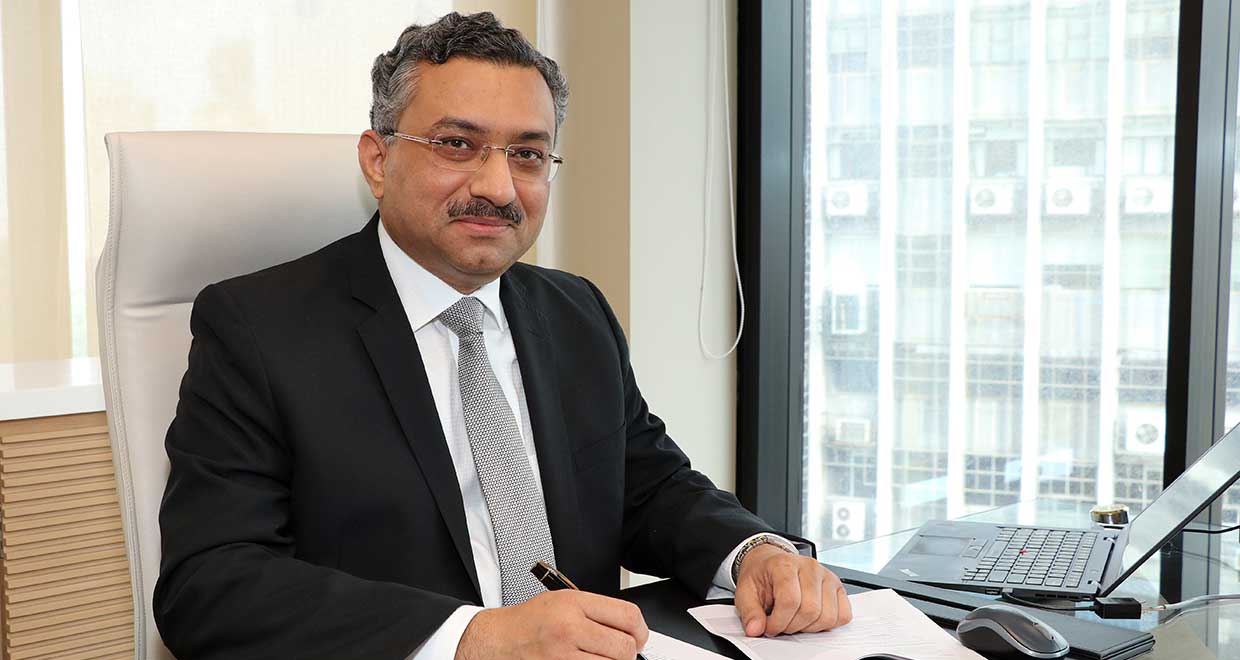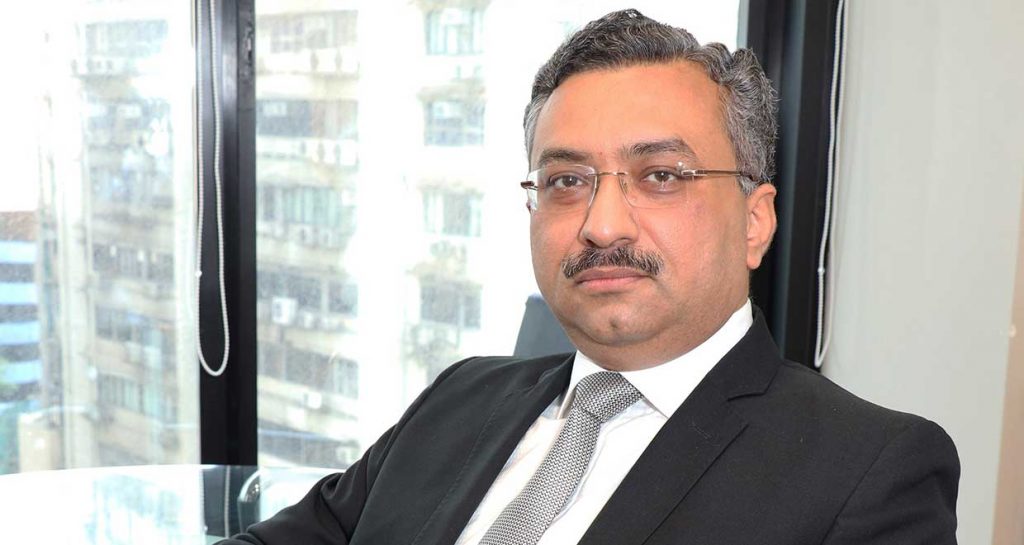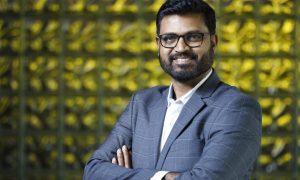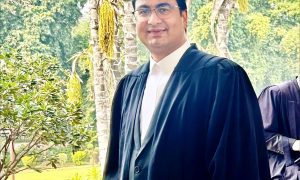Rajendra Misra graduated in law from University of Calcutta, in 1991. After successful stints at Indal, Dunlop India Limited, ITC Limited, and Hindustan Unilever Limited, he is currently Senior VP-General Counsel at Taj Hotels Palaces Resorts Safaris. Mr. Misra is the chief legal advisor to the CEO and Board, advising on legal implications of business issues, proactively spotting prospective legal issues, counselling the executive management on legal and regulatory aspects etc. His role encompasses Strategic Litigation planning, Litigation management, selecting and supervising outside counsel, driving strategic initiatives to achieve business objectives while also ensuring adequate protection of legal rights of the organization, building strategic partnerships and alliances with outside counsel and attorneys, Risk minimization and Risk management, developing a Compliance culture, Corporate governance, process improvements, using technology as a tool for efficient management of the function, and developing and managing the team.
In this interview we speak to him about:
- His role in ushering in crucial reforms at Taj
- Receiving accolades such as “GC Powerlist: India 2016″, “Trailblazers: India’s Finest In-house Counsels” by the Indian Corporate Counsel Association, among others
- His illustrious experience spanning 26 years
Given that most of our readers are law students and young lawyers, how will you introduce yourself to them?
I come from a family of lawyers. My father started his law practice in Kolkata. My sister is a practising lawyer at the Calcutta High Court. I have several relatives as well practising law. I consider myself to be a student of law. I have spent 26 years in the legal field; however, the field is vast, law is ever evolving, and every day one is learning new things. The quest of knowledge is unending, and I am always keen to learn more.
What was it that got you interested in the legal field?
Even before I could understand its true meaning, the expression “Possession is nine points of law” fascinated me! I probably heard it from my father. I think it is the discussions between my father and my sister on legal issues which got me interested in law. Gradually, as my interest in law grew, I decided to make it my career. And once I made the decision, I pursued it seriously.
How was your experience in law school?
We were one of the initial batches of the integrated five year law course. Typically, the law schools teach you basics of law, laying the foundation. The other thing which you are introduced to is analytical thinking, debating etc., all of which help one later in life. During law school days, Constitutional Law, Contracts and Conveyancing were my subjects of interest. I believe it is extremely important for the students to supplement the knowledge from law school with practical experience gathered through internships. Even as I was studying law, I used to regularly attend the chamber of a Senior Advocate in Calcutta as a trainee. I used to make it a point to attend college, and then attend court post lunch, followed by attending chamber in the evening. Watching the proceedings in court was a great learning. Carrying on research work at the chamber was also a learning experience. I learnt early on the merits of being precise while drafting, that it always pays to say less and be precise, rather than say more and be rambling. Even before completing my law course, I had the privilege of assisting my senior in a case of copyright infringement. I had not read up on copyrights earlier and IPR was not in our curriculum. I researched the subject and found it interesting – very different from the regular property, inheritance and other civil cases. I think that exposure resulted in my interest in Intellectual Property Rights later.
Was the decision to work as an in-house counsel as opposed to working at a law firm a conscious one?
I was always interested in a counsel practice, as opposed to working at a law firm. As such, I never really considered the option of working in a law firm. I firmly believe that the decision whether to work in a law firm, or as a counsel or as an in-house counsel is an individual decision, and each one should decide on the basis of his/her interests.
So how did the movement from counsel practice to in-house counsel happen? Fairly early in my law career, Indian Aluminium Company, Limited (Indal) was looking to recruit an in-house counsel to handle their major legal cases. My father suggested I should consider applying. While initially I was a bit hesitant, he encouraged me to explore. I must say that I had never done an internship in an in-house legal department, and as such this was like walking into the unknown, taking a leap of faith. But I did take the plunge, and have never regretted it. It perhaps helped that Indal wanted me to handle its major legal cases. Therefore, I was never far away from litigation, courts and counsel. Gradually, of course, other aspects of the in-house counsel role also grew on me.
You undertook the Hawkesmere course on IPR in London, and have a Postgraduate Diploma in Patent Law. Can you tell our readers about this course?
Both these courses were part of the effort to continuously upgrade professional knowledge, and were extremely relevant at the respective point of time.
A couple of years into my career in ITC, I was given additional responsibility of supervising the IP Cell. Following this, I had gone to London for the Hawkesmere Course on International Intellectual Property Law. Hawkesmere used to conduct such courses aimed towards Continuous Professional Development of executives. This was a two day intensive course, and gave a great insight into various aspects of international IP law, which was very relevant at a time when the IP laws around the world were evolving following the TRIPs agreement.
Around 2005-06, ITC began diversifying into the Personal Care business. While I was heading its IP Cell, we were mainly into Trademarks and Copyrights. But with the diversification into the Personal Care business, we also began filing patent applications. So I decided to take up the Post Graduate Diploma in Patents Law course of NALSAR. This course was a mix of proximate education and on campus sessions. It was a wonderful way of undergoing training in patents law while working. The faculty was good and experienced. One got a great insight into patents. We had to research and submit two papers on patents as part of the PG Diploma course. The tough part, of course, was balancing work and learning. That was compounded by the fact that I was taking up studying nearly twenty years after having left college. Our professors had sound words of advice for those of us who were taking up studies after a long time – apart from training us on patents, we were also advised to practise handwriting, because twenty years after college, one tends to lose the practice of writing by hand, and it is not easy to write a two hour exam without first building up writing speed!
What got you interested in the field of IPR?
My introduction to the world of IPR was through a copyright infringement case on which I assisted my senior during my internship. We did not have Intellectual Property law as part of the law curriculum, and hence, this was then a totally alien field for me. But I enjoyed researching and working on this case. Later, when I began heading the IP Cell of ITC, my interests in this field of law grew further. The late 90s and early 2000s were momentous years for Intellectual Property Law in India, with India overhauling its IP laws after acceding to the TRIPs agreement. This is when the IP law really evolved in the country, and companies began putting greater focus on management and protection of their intellectual property. This field of law is really fascinating. Protecting brand names and logos is now extremely common place. However, with the new Trademarks Act, the ambit of trademarks has really expanded, and it is possible to protect sound, 3D marks, colour combinations etc. as trademarks. There is enormous scope to do innovative work in this area, and I believe that the potential of unconventional trademarks is waiting to be realised, particularly for FMCG companies, media organizations etc. who are extremely focussed on protection of their IP. Another interesting area is of Geographical Indications. I had a great exposure to this subject several years back in ITC when we were embroiled in a litigation relating to the GI Darjeeling, where the plaintiffs tried unsuccessfully to stop a hotel lounge by the name Darjeeling. The awareness of this new area of IP is increasing day by day, and recently I was delighted to find that a society of weavers in Kasaragod had registered a GI for Kasaragod sarees! The other area of IP which has great potential is patents. However, a good grasp of scientific knowledge gives a distinct advantage in this field. We must remember that at this point of time, the Indian economy has the potential to become the world’s third largest economy by the next decade, and one of the two largest economies by mid-century. The International Monetary Fund describes the Indian economy as the “bright spot” in the global landscape. As the economy grows and businesses expand, IPR will continue to become more and more important, and this will give tremendous opportunities to lawyers and law students.
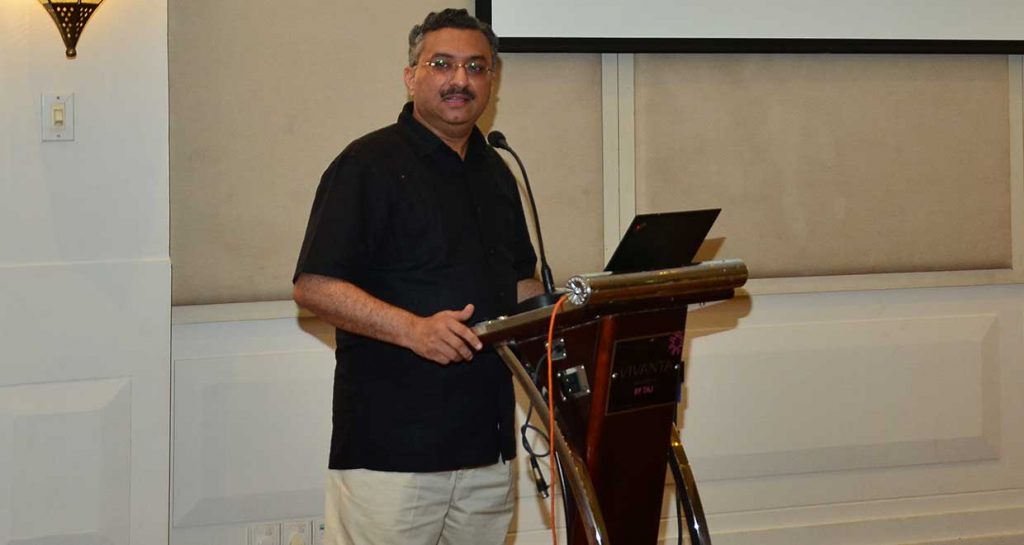
What would be your advice to our readers undecided about pursuing higher education?
Life is a process of continuous learning. My advice would be not to lose any opportunity of learning. If there is an opportunity of pursuing higher education in a field of interest, I would earnestly urge the readers to avail it. Particularly, if you get it before the start of, or early on in the career. I acknowledge that it may not be easy to pursue higher education later in the career. But, as they say, if there is a will, there is a way. My courses undertaken in mid-career were extremely relevant to my roles, and hence, I benefited greatly from undergoing the courses. I guess the key in such cases is relevance and interest.
What was your first job after law school?
Even as I was attending law school, I used to attend the chambers of a senior counsel in Kolkata, interning and learning the ways of courts. So post qualifying, I commenced going to court. In 1993 however, Indian Aluminium Company, Limited (Indal), a subsidiary of Alcan, Canada was looking for a legal resource to handle their major legal issues, which were till then being handled by a Dy. Company Secretary, who was due for retirement. I remember going for the interview in the most casual manner – straight from court without any preparation and wearing only a jacket and no tie – only to find to my horror several candidates immaculately dressed in suits and ties, seriously reading business newspapers and waiting to be called for the interview. I don’t know what my interviewer and future boss saw in me, because out of the many candidates, he chose a greenhorn like me for the assignment. God bless him for that choice, because thus began my journey as inhouse counsel in some of the topnotch companies.
It was a blessing in disguise that a few months after my joining, a library-full of files landed on my head – all relating to the major legal cases of Indal. These were high value litigations relating to electricity laws and mining laws. The best of legal brains of the country were appearing for Indal in these matters, and very early in my career I came to interact with them, initially with a sense of awe, but followed quickly by confidence, even as I saw and learnt from their discipline for this great profession. Several months down the line, Indal went for a Euro issue, and that pitched me in front of US lawyers, defending the major litigations of Indal and assuring them that all was under control and that Indal had good merits in these cases – something which I did with confidence, earning the Managing Director’s special award in the process. I handled my first merger transaction at Indal, when we merged a power generation company, which was a subsidiary of Indal, with the parent company.
Given that Indal was my first job, apart from learning about corporate law, I also learnt corporate language (very different from the language used in pleadings!), corporate behaviour and corporate dynamics at Indal. The early experiences in Indal transformed me from a counsel to a corporate lawyer. I learnt the importance of dispensing with legal jargon and talking/writing in simple language which is understood by business/non-lawyers. The Indal stint also introduced me to the fact that as in-house counsel, I should be looking at the business aspect of an issue apart from its legal aspects – the fact that legal manager has two facets – ‘legal’ and ‘manager’ – and the in-house counsel has to consider both legal and business aspects in order to arrive at a fine balance, serving the business interests of the organization while remaining within the boundaries of law.
Can you tell us about your time at ITC?
It was during 1997 that ITC was looking to augment strength in their Legal Department. I was then based out of Kolkata, and for any legal professional in Kolkata, ITC was a dream job. Therefore, when they offered to recruit me, without batting an eyelid I joined them. The ITC journey was a tremendous one. Fairly early in my ITC stint, I began partnering the Tobacco business, the largest business of ITC. Over time, as they spun off newer businesses, I got the opportunity of advising the newer businesses as well, helping them find their feet the right way, ensuring legal compliance even as the businesses grew, acquiring new brands, manufacturing facilities and companies for the organic and inorganic growth of the new businesses. Thus began my association with the Foods business, the Personal Care business, the Lifestyle Retailing business, the Matches & Agarbatti businesses, and the Stationery business – very diverse businesses. Even while doing so, I continued to partner the Tobacoo business, which had its own set of challenges, Tobacco being a heavily regulated industry.
ITC takes IP management very seriously, and it was my privilege to lead their IP Cell too. While during the Tobacoo/Foods/LRBD days, management of Trademarks and Copyrights was the dominant theme, the advent of Personal Care business also brought with it experience in handling Patents management. The most interesting thing was that with newer businesses being spun off, we also learnt on the job. Overall, it was a great time, with huge learnings. In many ways, we used to operate as an in-house law firm. We used to do a lot of drafting in-house – agreements as well as pleadings. We also used to do a lot of research in-house, and ITC had an excellent library of legal journals, law books, as well as legal research software like Manupatra, SCC Online, Excus, PTC, etc. to enable research. And, we used to take an active part in briefing counsel in our legal cases. With our drafting and research, we used to support our counsel and solicitors in a big way, something which was well appreciated by them.
The Tobacco business came up with innovative ways of advertising – it was the role of the Legal function to ensure that the business always remained within the four corners of law. Being a highly regulated industry, the Tobacco business took compliance with legal requirements extremely seriously, and the Legal voice was heard with respect. With the new businesses, I got the opportunity of creating and protecting new brands, acquiring new brands, negotiating and closing with new manufacturing facilities, sometimes buying new manufacturing facilities. The best part was the acquisition of a bio-technology company which was into production of seed potatoes, with manufacturing facilities in multiple countries. Due diligence in multiple jurisdictions, and structuring the transaction was extremely challenging. I distinctly remember the night prior to Closing, when we stayed up the entire night finalizing the transaction documents, to seal the deal at 10 o’clock in the morning. It was a tremendous experience.
As the years went by and my responsibilities increased, so did my levels. I moved on from being Asst. Manager – Legal to Asst. Solicitor to Associate General Counsel. From a solo start, the ITC stint gave me the experience of managing a team. I had a great time working with fantastic business leaders, excellent mentors, fine peers and a great team. Finally, after spending 14 years in the organization, I had a feeling that I had done all that was to be done in Kolkata and in ITC. I got an urge to spread the wings and fly away out of Kolkata, all the way to the western shores of the country – to its commercial capital. I was looking out when HUL called. And that was a dream assignment, too difficult to refuse.
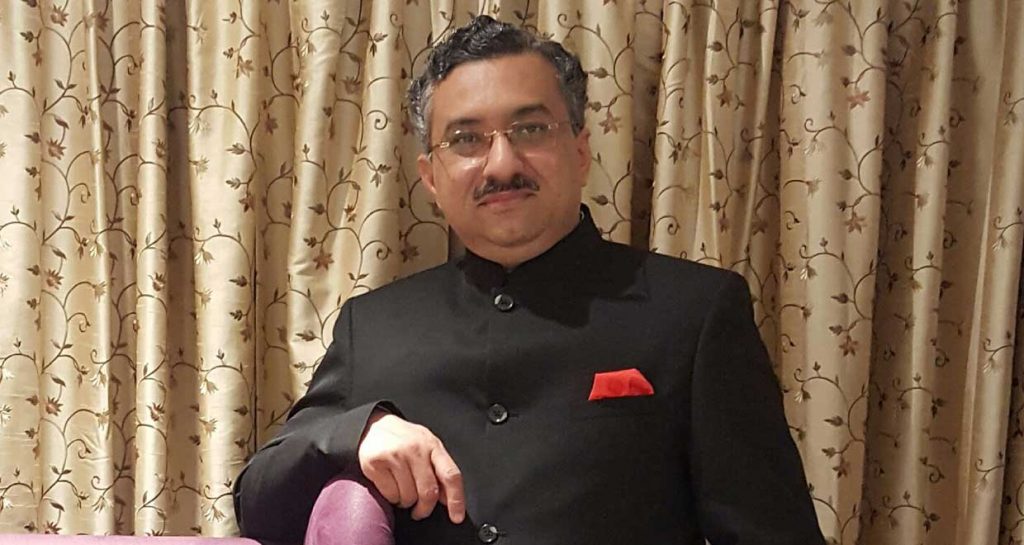
How did your appointment at HUL happen?
Unilever is a great organization. It is the king of marketing in the country. In 2011, HUL was looking for a senior legal resource for heading its legal team partnering the personal care and homecare businesses, the largest of its businesses, representing more than 75% of its turnover. It was my privilege that they selected me for the role. I became a part of the HUL Leadership team and the Legal Leadership team. Unilever is a powerhouse of great leaders. It would not be wrong to say that Unilever “manufactures” leaders, some of whom occupy some very senior positions across the industry today. It was a great time at Unilever, working and collaborating with some of the finest brains in the business today.
Over time, my role in Unilever grew. In addition to leading the legal team partnering the personal care and homecare business, I also got the charge to supervise the Legal team of Lakme Lever Ltd., a subsidiary of HUL. Later, the Water business and Kimberly Clarke Lever Ltd. also got added to my profile. Over time, in addition to my above responsibilities, I also became the Global Legal Counsel for Lifebuoy and Fair & Lovely, two iconic brands of Unilever, apart from discharging the role as Brand Development Counsel for the entire South Asia region. I must say that I thoroughly enjoyed my role in Unilever. The learnings were immense. Interacting with the best legal brains across the Unilever universe, one picked up global best practices, and came to learn about new and upcoming fields of law. The business teams in Unilever are demanding and one has to be nimble to manage them, and it was a joy working as a team. One of the most important things which Unilever experience brought out was the risk-taking appetite, something extremely crucial for the business. The best part was that Unilever gives you complete freedom in your job profile – the canvas is yours to paint. Another fantastic thing was that I had a young, energetic and dynamic team. Interacting with such a young and dynamic group was great and challenging at the same time. It kept you young and contemporary, but at the same time you also had to be several steps ahead of them. It was a joy mentoring these bright young legal minds.
At Unilever, I had the opportunity to look at, frame and defend some cutting edge product claims and advertising. The most memorable was a comparative advertising, where we showed the competitor’s product and claimed that our product was better than theirs. It was risky, but it was a calculated risk we took, and one which was worth taking, given that our product was truly cutting edge and better than competition. Therefore, the claim was factually correct, through it ran the risk of a competitive challenge. During the planning stage, I advised the business group that we should expect the competitor to take the battle to courts. I made intelligent guesses, and was able to accurately anticipate the court where they could file the legal challenge, and prepared counsel in advance so that we were in a position to defend our claims. My forecast proved correct, and we got locked in a fierce competitive battle with the competitor. We succeeded in defending our claims and in keeping the comparative advertising going for a long period of time despite the competitor’s attempts to shut us out. This campaign is a landmark in the history of comparative advertising in the country.
The other memorable piece of work was acquisition of a natural ayurvedic medicine brand and product for Unilever. With the rise in demand for natural products, and growth of new competitors in this field, Unilever set about acquiring this natural ayurvedic medicine brand and product line, and I was in the thick of due diligence and negotiations with the promoters of the product/brand, and we worked out a great deal for the company. Unfortunately, before we could ink the deal, I quit to move on to Taj, but it gave me immense satisfaction when the deal was finally concluded soon thereafter. It is a matter of pride to see the product on the shelf. Incidentally, this was not the first brand/product line purchase for me. I had done quite a few in ITC as well. And, today when I see these products on the shelf in retail stores, I feel immense pride in having been associated with these acquisitions, and have great stories to tell about them to my children.
Towards the end of 2015, Taj was looking to appoint a Senior Vice President – General Counsel on its Executive Committee – the highest executive body just below the Board of Directors of the company. When Taj gave me an offer to join their Executive Committee, reporting to the Managing Director, and overseeing the Legal & Secretarial functions, it was a great offer. During my professional career, I have always valued professionalism and high moral standards in an organization. Both Unilever and ITC are extremely professional companies, with high ethical standards. Taj and the Tata group are universally admired for their great professionalism and high ethical standards. Therefore, the organizational profile was a perfect fit. The role was also very interesting and challenging. Apart from supervising my function, sitting on the Executive Committee also gives me a great experience in understanding and analysing business issues, appreciating legal issues in a business context, prioritizing legal issues accordingly, and taking risk calls for business growth. Therefore, I decided to take the plunge and join Taj – a decision which I haven’t since regretted. Today, apart from being a member of the Executive Committee of Taj, I am also a Director on the Board of TajGVK Hotels & Resorts Ltd., a listed company which is a joint venture between Taj and GVK group.
Can you give our readers some insight into the reforms you brought in Taj during your time there?
At the Taj, we deal with a lot of contracts, under which we have valuable rights in respect of our 100 plus hotels. Contract management is an important area for us. In the modern world, contracts tracking on Excel sheets is sub-optimal and does not work. With advancement in technology, it was important that we use technology to our advantage in managing our important contracts. Hence, I deployed a Contract Management software at Taj. It serves as an archive of all our hotel management contracts and other important contracts, and also tracks contract renewal dates and auto-generates alerts for the team, ensuring timely renewals, and risk mitigation.
The next issue was ensuring uniformity of contracts across the organization. My team is spread over multiple locations. It is crucial that everyone in the team follows standardized contract templates, instead of digging into personal drives and using different contract formats. Hence, I constituted a Task Force to standardize about 25 of our main contracts. We spent a lot of time discussing and debating the changes to these contracts. And, we did this inhouse because we believe that being closest to the business, we were the most equipped to standardize our contracts keeping in mind our business requirements and challenges. Once standardization happened, we uploaded the standard versions of the contracts on the Contract Management software so that everyone uses the same format, regardless of location. This ensures consistency of contracts, and has minimized risks for the organization.
Laws impact everyone in the organization, and increased legal awareness leads to greater compliance and lesser risk exposures; hence, it is important to spread legal awareness within the organization. Here again, I decided to use technology to our advantage. We have developed e-learning modules (Learning Management System or LMS) for our employees on five crucial subjects – Data Privacy & Protection, POSH, Competition Law, Insider Trading, and Related Party Transactions. These are interactive e-learning modules which will explain legal topics in very simple terms and with examples for the non-legal employees.
The Taj group had deployed a Compliance Management system at its units. I have now commenced Gap analysis, which is in the nature of an audit that will help us identify and fill up gaps, if any, in the compliance management by individual units. This will further strengthen the compliance management within the organization.
Similarly, Taj was in the process of deploying Litigation management software and Intellectual Property management software. We went full throttle in order to operationalize them on priority basis. All Taj litigations and IPR have now been uploaded onto the Litigation management software and the Intellectual Property management software, leading to better management of litigations and IPR.
I believe that with all the above measures, people in the organization can sleep better, assured that we are doing the right thing, in the right way and that our risks are getting minimized.
You pioneered an initiative which led to the Taj Mahal Hotel building in Mumbai being India’s first building to secure a trademark for the image of the hotel. Can you tell our readers about how you achieved this?
The image trademark registration was a result of a combination of many factors, my fascination with unconventional trademarks being one. The other was the constant feeling of what more one can do to protect the rights of my organization, and how can I ring fence it better. Yet another was the desire to create value for the organization, because I believe that the Legal Department is not just a cost-centre, it can also create value for the organization. The Taj Mahal Palace, Mumbai is the iconic flagship of Taj Hotels Palaces Resorts Safaris, and is a defining structure of Mumbai’s skyline. The distinctive red-tiled Florentine Gothic dome of the hotel, which crowns the elegant Indo-Saracenic arches and architraves of the iconic hotel, sits 240 feet above street level. Since 16th December, 1903, when the hotel first opened its doors to guests, its striking dome has been the triangulation point for the Indian Navy to guide them in the harbor. It is widely recognised as the temple of hospitality. I do not need a signboard on this iconic property for the public to know that it is the Taj hotel. One look at the property and you know that it is The Taj Mahal Palace, representing the finest in Indian hospitality traditions. To my mind, that is exactly what a Trademark is. Therefore, I went about securing this image trademark registration. After conceiving this idea, I presented it to the Managing Director and my peers at the Executive Committee, who enthusiastically supported it. We got the trademark applications filed through Anand & Anand, the top notch intellectual property law firm in the country. The applications were pursued on top priority, and we were able to secure the registration in 7 months. I must say that a stellar role was played by the Trademarks Registry and by Anand & Anand in prosecuting the applications and securing the registrations. Often, people who are part of a historic moment do not realise that they are creating history, and I daresay that most of the people who participated in the process may not have realised the significance of the moment. But history it certainly was – we had become the first Indian building to have secured image trademark registration. Only a few iconic buildings across the world have been able to secure such registration – the Empire State Building, the Chrysler Building and the Sydney Opera House to name some. With this image trademark registration, the iconic Taj Mahal Palace, Mumbai became a member of this unique and elite club – the first Indian building to do so. As an Indian, that swells my heart with pride. As an employee of The Taj group and Tata group, it makes me immensely happy that I have been able to get such a unique protection and status for our legendary hotel. This is a very unusual and unconventional trademark, and the outcome of a pioneering effort. Many organizations register brands and logos as trademarks. However, the scope of “trademark” is much beyond mere brands and logos. Sound, images, colour combinations, 3D images etc. can also be registered as trademarks. Such unconventional trademarks can create great value for organizations, representing its USP. And, being beyond the conventional, they can become great talking points for organizations.
Can you tell our readers about IBHA’s role in the industry?
(Mr. Misra has been the chairman of Indian Beauty and Hygiene Association.)
IBHA is the premier industry association representing reputed personal care/beauty/FMCG companies in the country, viz. HUL, P&G, L’Oreal, Marico, Dabur etc. IBHA plays a key role in advocacy on behalf of the industry with the government. I was Chairman of the Legal Committee of IBHA, and used to play a very active role on various industry issues. We made representations to the government on various issues impacting the industry. I strategized and handled several legal issues/litigations on behalf of the personal care industry. In my capacity as the Chairman of its Legal Committee, I was the Legal advisor to the Executive Committee of IBHA, which comprised of the Personal Care Director of HUL, COO of L’Oreal, MD of Godrej Consumer Products, CEO of ITC’s Personal Care business etc. It was most wonderful interacting with these industry captains, advising them on the legal issues impacting the industry.
You have often been recognised as one of the finest in-house counsels in India. What are the qualities required to succeed as an in house counsel?
It has been an honour to have got recognition from such leading organizations as The Legal 500 and the ICCA. To succeed as an in-house counsel, one needs several qualities. First and foremost, one needs to have an analytical mind, and should be capable of making dispassionate analysis of issues. Together with legal knowledge, one should have a good understanding of the business of the organization. Risk-taking appetite is an extremely important quality which an in-house counsel should have. An in-house counsel should be solution-oriented, providing the business with solutions to their problems rather than raising the red flag on everything. It is also extremely important that he should be able to speak out his mind without fear or favour, keeping the interest of the organization and all stakeholders over everything else. Above all, an in-house counsel should have the ability to balance the business and legal aspects, and achieve the optimum balance which will ensure that the organization achieves its business objectives without compromising on legalities.
What are the challenges you have faced in building your career as it stands today?
One issue which readily comes to mind is the growth challenge in Kolkata. As I mentioned earlier, after 14 years in ITC, I had a feeling that I had done everything possible in ITC and in Kolkata. I was born and brought up in the city, and always worked there. However, at that point of time, I was faced with the situation that if I had to grow my career further, I had to leave my city of birth and move to unknown pastures. Having spent 40 years in a city, that is not an easy decision to take. However, I took the bold decision to quit my job at ITC, and leave my city of birth to move to HUL in Mumbai. At that point of time, it was very unsettling. However, in retrospect, I am glad that I took the decision to move out. My movement to different organizations has given me the opportunity to expand my knowledge and experience. Over time, I have learnt that change is a constant. There is always risk in change; however, as they say, “A ship is safe in harbour, but that is not what ships are meant for.”
How do you stay up to date about the recent developments in all the fields you work in and have an interest in?
It is extremely important to stay updated about the latest developments in the legal field. I once came across the statement ,“If the rate of change outside is greater than the rate of change inside, then you become redundant”. That to me underlines the importance of keeping oneself updated with the latest. The world today is changing faster than ever, with new developments coming about everyday. It is important that our knowledge keeps pace with this fast-paced development all around us. Keeping oneself updated also enables one to correctly analyse a situation and advise in any given scenario. Latest changes in the legal field can be gleaned from various sources, viz. the media, professional social media, legal journals, Manupatra alerts, Google alerts etc., as also from participating in various professional knowledge-sharing groups. I also attend conferences and seminars on topics of interest in order to keep myself updated.
What advice do you have for our readers who are primarily college students?
A career in law is a great one to take up. Knowledge is the most important asset of professionals. My advice to college students would be to keep increasing their bandwidth of knowledge. Do internships at good organizations and keep gathering new experience.

